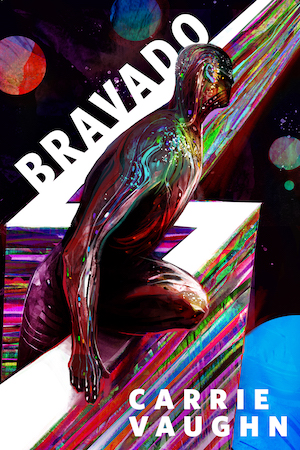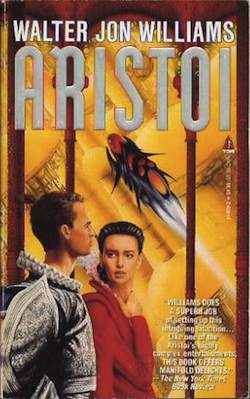Walter Jon Williams’s Aristoi (1992) is one of those books like Raphael Carter’s The Fortunate Fall (post) that is about the possibility of changing your mind. Literally. It’s about the possibilities opened up when we aren’t limited to the human mind. Aristoi posits nanotech, in-brain implants, virtual realities, and techniques of advanced consciousness creating sub-personalities who can operate independently, daimones. The world—worlds, for though Earth was destroyed by runaway “mataglap” nano, there are now lots of other terraformed and colonized worlds—is divided into the demos, ordinary people, the Therapontes, those who aspire to become Aristoi, and the Aristoi themselves, the best and brightest among humanity, rulers of worlds, makers of laws, controllers of nanotech. They rule their domains absolutely, but immigration between domains is free, so the odder ones tend to lose population.
Aristoi is a cleverly constructed utopia, and has the main problem of utopias, which is that it can be challenging to find a plot other than “look at my beautiful garden.” The first half of the book is essentially “beautiful garden” and the second half develops a plot that doesn’t really work. But since the garden is in this case so very interesting and the view of humanity is so unusual, it actually doesn’t matter. This is not a book I come back to for the plot. It’s a book I come back to because Williams wrote about people becoming more than human and almost made it work.
I think this book is among the best that Williams has written, and it seems to me one of those books that everybody should have read—but of course it isn’t. It came out in a very strong year, 1992, and didn’t get any award love, and it didn’t ever become a major novel. So I’m going to talk about it on the assumption that you probably haven’t read it but might be persuaded to seek it out. It isn’t a perfect book. The word I keep coming back to talking about it is “interesting.” It’s science fictionally interesting, it’s ambitious, its reach is exceeding its grasp and yet it keeps on reaching. It’s the kind of book that gives you chewy things to think about.
Although this is one of Williams’ best books, it’s not my favourite. I tend to enjoy reading his others much more. This is because when it comes down to it it’s characters I care about, and our protagonist here, Gabriel Aristos, is a jerk. He’s smug and decadent and just too perfect, and when he is brought down to the level of humanity he’s then whining and pathetic. I don’t care for him. I don’t like his subpersonalities either. And most of all I hate his habit of thinking he can fix everything, but everything right for everybody—himself, personally. He really does think he’s God—and that’s part of Williams’s achievement, because he really does, and it’s been pretty much true. And it’s perfectly reasonable that somebody like that would be like Gabriel. But I don’t like him. The utopias that work for me are all from the point of view of somebody who is unhappy there. Gabriel is perfectly happy, perfectly fulfilled. I’m actually glad when he has to face something he knows he can’t fix—but it doesn’t bring him growth as a character, far from it, he just wants to fix humanity so that nobody has to be human any more.
The Aristoi rise by learning, creating daimons and passing exams, they rule through having all the power, and through “mudras,” positions of dominance that act on people’s subconsciouses to make them obey. There are other nice touches in the description of the virtual reality, especially when the Aristoi are showing off for each other. Williams makes them convincingly astonishing—writing symphonies and poetry, designing planets, advancing science. These are people who are at the level of Leonardo, and this does work.
One thing I don’t like—messing about with typography to represent two things going on at once. This “split screen” page doesn’t work for me. It doesn’t feel like simultaneity, it interrupts my natural reading flow and drives me mad. I wish he hadn’t done it. I can see what he wanted to do and I understand why he did it. I just don’t like it.
I already mentioned the utopian weakness of plot—there’s a mystery, and exploring the mystery is more interesting than the way it is resolved. Having said that, it’s a plus that I find the plot forgettable, it means I forget it and so it’s new every time.
What Williams has achieved here is making a world that isn’t like anything in history and which feels like a plausible decadant post-scarcity post-human future. He also does very well for the tech still seeming futuristic—which for a 1992 novel is impressive.
The natural comparison on “better living through split personality” is Bujold’s Mirror Dance (post). In Mirror Dance the protagonists are driven by circumstances to make subpersonalities to help them cope. In Aristoi everyone is doing it on purpose. Split personalities are generally seen as a bad thing, but both of these books treat them surprisingly positively.
Aristoi isn’t in print, but I hear that Walter Jon Williams may be releasing it as an e-book soon, along with some other books of his like Angel Station (post) and Knight Moves (post).
Jo Walton is a science fiction and fantasy writer. She’s published two poetry collections and nine novels, most recently Among Others, and if you liked this post you will like it. She reads a lot, and blogs about it here regularly. She comes from Wales but lives in Montreal where the food and books are more varied.










